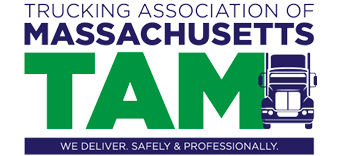TAM Testimony – In support of Acts Relative to Rolling Stock
The following testimony – and detailed documentation on our position – was sent today to Massachusetts Joint Committee on Revenue members. Our testimony strongly supports House Bill 2841, Senate Bill 1178, and Senate Bill 1949, Acts Relative to Rolling Stock. The letter is available as a PDF to be printed.
Dear Chair Cusack, Chair Moran and Members of the Committee:
On behalf of the over 250 member companies of the Transportation Association of Massachusetts (TAM), I am writing in strong support of House Bill 2841 / Senate Bill 1178 / Senate Bill 1949, Acts Relative to Rolling Stock. This initiative, which will lead to greater public safety and a cleaner environment, will also lead to additional tax revenue while creating numerous jobs with competitive salaries. The legislation, which has been passed by the Massachusetts House of Representatives as part of other legislative vehicles in the past three sessions, received a favorable report from this Committee the past two sessions.
As you may know, TAM has been the voice of the trucking industry in Massachusetts since 1919. One of the oldest transportation associations in the United States, we represent a wide variety of companies ranging from small, family-owned trucking companies with a single truck to large national trucking companies with thousands of trucks. The trucking industry within the Commonwealth is responsible for transporting over 90% of all goods and products found in our homes and workplaces. In addition to being a key facilitator for the growth of other industries, the trucking industry is a significant creator of jobs within the Commonwealth. As a recent study by the Dukakis Center for Urban Research & Policy at Northeastern University stated “[t]he overall trucking industry (including private and for-hire tucking) represent about one in 12 jobs or about 300,000 jobs in Massachusetts in 2017. And, trucking companies meet all Massachusetts freight movement needs.” (“The Importance of the Trucking Industry to the Massachusetts Economy”, Pritchard, R. & Scott, A., p.3 (May 2018)). In terms of employment demographics, the trucking industry is quickly diversifying as companies seek drivers to meet the growing need for trucking. (“Truck Driver Shortage Analysis 2019”, Costello & Karickhoff, American Trucking Associations, July 2019)(“ In 2018, 40.4% of [truck] drivers were minorities, which has jumped 13.8 percentage points from 26.6% in 2001.).
Notwithstanding the significant impact of the COVID pandemic, rising fuel costs and a depleted workforce, the commercial trucking industry within the Commonwealth has been experiencing a decline as many trucking companies have moved to other states or simply closed down. Part of the reason that trucking companies have left the state is due to the Commonwealth’s tax policies. In particular, the Massachusetts Department of Revenue (DOR) collects sales and use tax for rolling stock purchased in other states which have an exemption in place for rolling stock. (i.e. tractors and trailers used in interstate commerce). As a result, any company with a nexus within the Commonwealth is being charged sales and use tax by the DOR even though the rolling stock was purchased in other states. Accordingly, various truck companies, who may be domiciled in Massachusetts or have repair facilities in Massachusetts, are now seeking to locate them outside of the state to reduce the nexus necessary to collect such tax.
Exempting the sale and use of rolling stock from taxation will bring Massachusetts in line with a majority of other states (37) within which an exemption from sales and use tax for rolling stock already exists. In fact, every surrounding New England state, except Vermont which applies a de minimus fee, has a rolling stock exemption in place. That said, amending Mass. Gen. Laws ch. 64H (i.e. sales tax) and Mass. Gen. Laws ch. 64I (i.e. use tax) to specifically exempt rolling stock from the sales and use tax brings much more than simple tax relief to the trucking industry. According to the aforementioned study conducted by the Dukakis Center for Urban Research & Policy, the elimination of the sales and use tax on rolling stock will, following national trends, create “2,768 more employees and 2,076 more power units … operating and generating an additional $15.9 million in tax revenue per year; while not estimable, … the impact on private fleets may be just as large.” (“The Importance of the Trucking Industry to the Massachusetts Economy”, Pritchard, R. & Scott, A., p.14 (May 2018)).
The need for eliminating the taxation of rolling stock cannot be overstated. First, this initiative will create a more attractive environment for trucking companies to remain in the Commonwealth. Trucking companies rely on constantly maintaining and upgrading their equipment. This means purchasing new rolling stock on a regular basis. If trucking companies know that their out-of-state purchases will incur an in-state tax, the companies will work to continue to reduce their nexus to the taxing state. As it stands, Massachusetts trucking companies are already at a competitive disadvantage when competing against carriers located in the neighboring states.
Second, but just as important, this initiative will have a significant positive impact on public safety and the environment. Exempting the sale and use of rolling stock from taxation will encourage the purchase of new equipment with the latest technology available as well incentivize companies to operate their newer trucks in the Commonwealth. This directly increases public safety and creates additional environmental benefits. In terms of public safety, new trucks include lane-departure, crash collision and speed regulator technology that significantly improve road safety. In terms of environmental benefits, newer trucks have more efficient engines and exhaust systems. This leads to greater fuel efficiency and reduces emissions of NOx and particulate matter to further support the Commonwealth’s fuel efficiency and clean air efforts. Given the Commonwealth’s recent interest in reducing emissions from the transportation sector, the rolling stock initiative makes even more sense.
Third, by keeping trucking companies in the Commonwealth, the good jobs and competitive salaries that these companies offer will remain within the state. According to the United States Bureau of Labor Statistics, Massachusetts is in the top ten for annual mean wage for heavy and tractor-trailer drivers within the country. (See http://www.bls.gov/oes/current/oes533032.htm). If more trucking companies find Massachusetts tax policy less favorable than neighboring states, it is likely the decrease in Massachusetts trucking companies will become even more significant.
Fourth, if the Commonwealth discourages trucking companies from domiciling in the state, transportation expenses will rise — further impacting the high cost of living already experienced in the Commonwealth. The costs associated with transporting goods are fairly straightforward. (See https://truckingresearch.org/2022/08/10/an-analysis-of-the-operational-costs-of-trucking-2022-update/) (“Total marginal cost of trucking grew by 12.7 percent in 2021 to $1.855 per mile, the highest on record. Leading contributors to this increase were fuel (35.4% higher than in 2020), repair and maintenance (18.2% higher than in 2020), and driver wages (10.8% higher than in 2020”). If the Commonwealth’s tax policies continue to cause trucking companies to domicile elsewhere, the additional fuel, tolls and vehicle maintenance, among other costs, will be borne by Massachusetts residents and businesses that already rely on the industry for over 90% of their goods. If the COVID-19 pandemic demonstrated one thing about the trucking industry, it is that it remains essential to residents and businesses alike.
This initiative is a matter of common sense. Given that neighboring states such as New York, Rhode Island, Connecticut, New Hampshire and Vermont (partial) exempt rolling stock from sales and use tax, Massachusetts’ current tax policy is causing higher costs for Massachusetts residents and businesses while driving economic opportunity to neighboring states. This initiative, which has been passed by the Massachusetts House of Representatives during the past three sessions, will not exclude trucking companies from the myriad of other taxes and fees the industry pays to the Commonwealth each year. This initiative simply tries to keep Massachusetts on par with the vast majority of states (37) with an exemption already in place.
On behalf of the thousands of men and women in Massachusetts who rely on the good jobs and competitive salaries these Massachusetts companies provide; I respectfully request that you issue a favorable report to this legislation. Again, including language to create an exemption from the Massachusetts sales and use tax as applied to rolling stock for trucks will produce additional tax revenue in the future while strengthening the trucking industry in Massachusetts in a manner that also improves the environment and public safety.
For your review, I have attached a variety of information about this initiative for your review. If you have any questions or concerns, please do not hesitate to let me know. I appreciate your consideration of this important matter.
Sincerely,
Kevin Weeks
Executive Director



